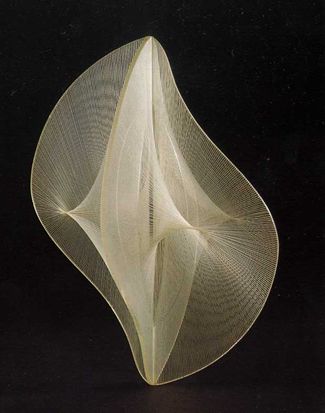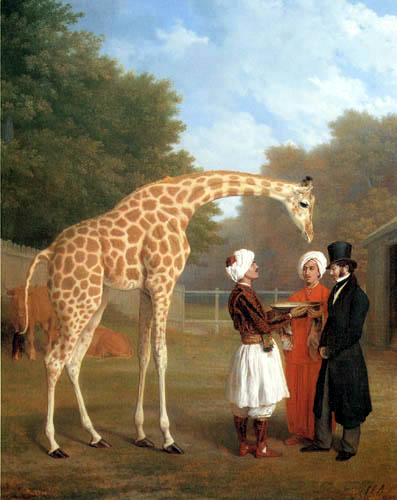 Naum Gabo, Linear Construction No. 2, 1949
Naum Gabo, Linear Construction No. 2, 1949Location: The Kuhne Household, Shoreview, Minnesota.
Exchange: E. and his son, A., came to visit while Joshua and I were at the Kuhnes. The two are from Denver, Colorado, and E. knows my dad through their work as Professors and with Public Achievement. When it came time to select Arty Calling Cards, I chose Linear Construction No. 2 and It Is Man. I love the simple yet almost musical pattern in each image, and the F. family struck me as a modern, progressive household worthy of the best that Gabo and Kapoor have to offer.
Characterization: I'm beginning to think that characterizing the recipients of my Arty Calling Cards is not feasible nor fair. For the people I know and love, it's easy; but for those I've just met, I think anecdotes may have to suffice. The two that come to mind for E. are about growing up and Muhammed Ali.
E. is a lovely father: he's attentive to A. and seems to derive real joy from watching his son interact with the world. The morning after Joshua and I arrived, E. shared with us a fatherly realization: children grow up. This is a well-known fact, and yet, it's only when we see mothers and fathers with their grown or almost grown children that it really makes sense. A. uses E. as a jungle gym and a safety net all at once. When I'm good, I call home once every other week. The contrast is startling and scary, and I am empathetic. I love my family, and yet I left. I continue to leave. That's what children do; but I'm also aware that I haven't made things easy for my parents. I've lived and traveled far away, and my calls home are infrequent and spotty at best. I mentioned this, and I'm afraid I may have made E.'s heart sink a little bit more. If I may offer a consolation now, let me say that I always come home, and homecoming is always sweet.
The second anecdote is one E. told. Once upon a time, E. attended a conference. In the middle of a lecture, Muhammed Ali entered the auditorium and began performing magic tricks; having lost his faculty of speech, Mr. Ali chose instead to communicate through magic. One day, during the same conference, E. stepped into the elevator. As chance would have it, the glamorous Mr. Ali joined him. E. stuttered something admiring and unintelligible; Mr. Ali calmly, serenely nodded his head in ascent. E. felt as though he had been blessed.
 Maurice Denis, Portrait of Yvonne Lerolle, 1897
Maurice Denis, Portrait of Yvonne Lerolle, 1897Location: David's Graduation Party, The Collette Household, Minneapolis, Minnesota.
Exchange: Mike and his mother, Ina, drove down from Mora, Minnesota to attend David's Graduation Party. I have fond memories of both Mike and Ina from growing up, and I'm always happy to see them. For a while, Mike was going to be my step-father and I guess Ina would have been my step-grandma, but now they just have the distinction of being some of my favorite people. I knew right away which Arty Calling Cards to select: the Portrait of Yvonne for Ina, and Wild Cattle at Chillingham for Mike.
Characterization: Ina is a rare treasure: not only is she a elderly country woman, but she is also open-minded. Although I don't know her as well as I wish I did, I am always struck by her compassionate and kind nature. She's both interested and smart, and before I went off to New Orleans to teach, she sent me Jonathon Kozol's new book. I have a feeling that she knew what I was getting into, even if I didn't. The Portrait of Yvonne is perfect for a woman as beautiful and kind and calm as Ina.
 Anish Kapoor, Installation: It is Man
Anish Kapoor, Installation: It is ManLocation: The Kuhne Household, Shoreview, Minnesota.
Exchange: A. also received an Arty Calling Card, and after this four year old recounted Hindu mythology to us at the dinner table, I knew he had to have the Arty Calling Card of an Indian genius.
Characterization: A. also has two anecdotes. After a long day playing with Eamon, watching baseball, and meeting new people, little A. was tired and overstimulated. As E. put him to bed that night, he admitted that he felt a little "out of control." Hearing about this exchange later, we were all impressed by his self-awareness. The second story is just as startling and precious in its maturity: A. woke up late after a few of us had gone running, and he padded upstairs to find Joshua at the dining room table. He came up to Joshua and said, "you need to close the door because of Global Warming. I did it for you this time, but you have to do it next time."
Location: David's Graduation Party, The Collette Household, Minneapolis, Minnesota.
Characterization: The first time Joshua met Mike, Mike was wearing sooty coveralls, his face was covered in ash, and his hair looked as if it had been electrocuted. I introduced the two, and it seemed to me that Mike's handshake could have swallowed Joshua whole. This full-time farmer, part-time DNR man, and sometime fire fighter is one of my favorites.
 Sir Jacques-Laurent Agasse, The Nubian Giraffe, 1827
Sir Jacques-Laurent Agasse, The Nubian Giraffe, 1827Location: David's Graduation Party, The Collette Household, Minneapolis, Minnesota.
Exchange: I was sitting on the couch amidst a sea of Gundersons when Fadia and her husband, Yusuf, walked into David's Graduation Party. My mom introduced Joshua and I to the two of them, and Fadia and I hit it off right away.
Characterization: Yusuf and Fadia moved to the United States in 1968 to attend University. Although they had intended to return to Jerusalem, political unrest prevented them, and Yusuf found work with the University of Minnesota. Since then, they've become citizens, but they remain active in the Palestinian community. My mom met Fadia when she attended a lecture on peace in the Middle East, and they've been friends ever since. Besides their international origins, Yusuf and Fadia are avid travellers, and have many stories about their adventures abroad. Once Fadia and I started talking, we covered quite a bit of territory: my tattoos, art, imperialism, and post-colonialism. It was during this last topic that I mentioned Edward Said, who I read while I was writing my Art History thesis. Fadia looked surprised and asked me if I had found him easy to understand. I laughed and said that he was every bit as dense as Foucault or Derrida. Fadia smiled and said, "I met him once. He's Palestinian, you know, and he came to my house. He was so handsome, and when I went to serve him his tea, my hands were shaking with the tray."
So, yeah. Fadia is a big deal. She's super cool, and she's met Edward Said. Naturally, I had to give her my only Orientalist Arty Calling Card.
Lovely images, Ellie, and thoughtful words. I'd like to read a posting, if you get the chance, about what it is like for you to come "home" for this short, intense time, all the while plotting your trip. It has to be a strange limbo experience.
ReplyDeleteI hope that Eric and Atticus read this - those were lovely profiles (and quite fair, given your hesitations).
I'm glad that Mike is still in your life; he's a good man.
I can't get over how much simple representations of paintings add to this blog. It's really quite striking.